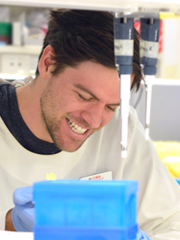Gregory Quaife-Ryan

Research Project
The structure and function of the human heart is irrevocably changed after heart attack, resulting in considerable mortality and morbidity. Until recently, the contractile cells of the heart were thought to be largely quiescent and non-proliferative after infarction. However, recent evidence published by my supervisor Dr Enzo Porrello, suggests that neonatal mice are capable of regenerating after heart attack through a process that relies on the proliferation of heart contractile cells and the replacement of cardiac scarring with the healthy myocardium (Porrello et al., Science, 2011; Porrello et al., PNAS, 2013).
In 2006, Shinya Yamanaka discovered that the expression of 4 factors in terminally differentiated somatic cells “reprogrammed’ their cellular identity into pluripotent stem cells (cells able to differentiate into any cell type in the body). By utilizing the paradigm of cellular reprogramming, my project aims to utilize neonatal cardioregenerative genes to reprogram non-proliferative adult hearts and pluripotent stem cell-derived mature human cardiac organoids into a neonatal-like proliferative state to facilitate heart regeneration. This project is at the cutting-edge of the regenerative and cardioregenerative biological fields, has the potential to make a substantial contribution to what we know about cardiac regeneration and produce promising candidates for stimulating human cardiac regeneration after heart attack.
Achievements
| Awarded the graduate student of the year Student Research Excellence Award by the School of Biomedical Science, UQ | 2018 |
| Recipient of the International Society for Heart Research Student Publication Prize | 2018 |
| Awarded the ISHR/CSANZ Student Prize for Best Mini-Oral Presentation, Awarded by the International Society for Heart Research & Cardiac Society of Australia and New Zealand | 2018 |
|
Awarded the Peoples’ Choice Award for Best Presentation, UQ Medical Society Research Conference |
2018 |
| Australian delegate to the 68th Lindau Nobel Laureate Meeting, Awarded by the Australian Academy of Science & the Lindau Nobel Laureate Committee | 2018 |
| Recipient of the Australian Physiological Society PhD Student Grant | 2018 |
| Travel Award to the Max Planck Heart and Lung School, Awarded by the Max Planck Society | 2018 |
| Recipient of Travel Award for Science at the Shine Dome Event, Awarded by the Australian Academy of Science | 2018 |
| Australian Society for Medical Research QLD Student Conference, Best Oral Presentation | 2018 |
| Winner of The Australian Physiological Society PhD Student Research Publication Prize | 2017 |
| Winner of the Excellence in Student Publication Prize, The University of Queensland | 2017 |
| Translation Research Institute Symposium, Runner-up Best Presentation | 2017 |
| Recipient of the UQ Research Scholarship | 2016 |
| Recipient of the School of Biomedical Science Top-Up Scholarship | 2016 |
| Recipient of the International Society for Heart Research Travel Award | 2016 |
| SBMS International Postgraduate Symposium, Best Talk | 2015 |
| Recipient of the Australian Postgraduate Award | 2014 |
| Summer research scholarship, University of Queensland | 2010-2011 |
| Recipient of 3 Dean’s commendation for high achievement | 2010-2011 |
| Recipient of the Commonwealth Scholarship | 2008-2011 |
Publications
1. Dang L.T., …, Quaife-Ryan G.A., …, Ramialison M., 2018. TrawlerWeb: an online de novo motif discovery tool for next-generation sequencing datasets. BMC Genomics. Accepted Manuscript
2. Quaife-Ryan G.A., …, Hudson J.E., Porrello E.R., 2017. Multi-cellular transcriptional analysis of mammalian heart regeneration. Circulation, 136(12), pp.1123–1139
3. Mills R.J., …., Quaife-Ryan G.A., …, Porrello E.R., Hudson J.E., 2017. Functional Screening in Human Cardiac Organoids Reveals a Metabolic Mechanism for Cardiomyocyte Cell Cycle Arrest. Proceedings of the National Academy of Sciences, 72, p.201707316.
4. Quaife-Ryan, G.A., Sim, C.B., Porrello, E.R., Hudson, J.E., 2016. Resetting the epigenome for heart regeneration. Seminars in cell & developmental biology, 58, pp.2–13.
4. George, A.J., …, Quaife-Ryan, G.A., …,Hannan, R.D., 2013. A functional siRNA screen identifies genes modulating angiotensin II-mediated EGFR transactivation. Journal of cell science, 126(Pt 23), pp.5377–5390.
